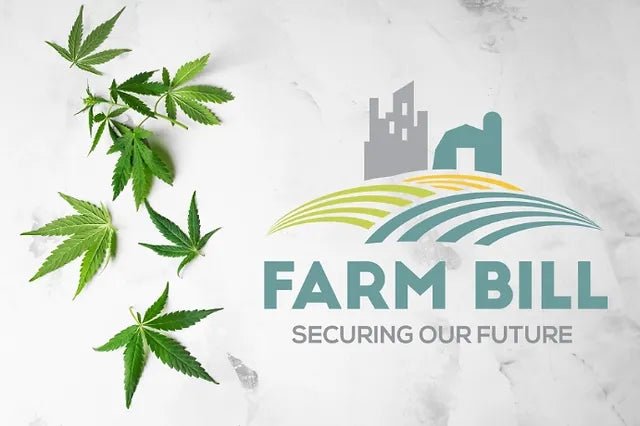While including the controversial provision is disconcerting and potentially disastrous for the hemp industry, congressional insiders see it more as a symbolic gesture.

The drama and, at times, embittered infighting over how to handle intoxicating hemp derivatives (IHDs) in this year's Farm Bill continued on Capitol Hill Thursday with the inclusion of an industry-killing amendment aimed at banning all IHDs in this year's proposed $1.5 trillion agriculture spending measure.
Earlier this week, U.S. Rep. Mary Miller (R-IL) filed a proposed amendment that would federally ban products containing detectable amounts of THC along with any cannabinoid "synthesized or manufactured outside of the plant."
Miller's amendment would also redefine hemp under federal law as any cannabis plant with 0.3% or less delta-9 THC, including tetrahydrocannabinol acid, or THC-A, the biosynthetic precursor to THC that becomes intoxicating THC when heated.
"I am offering an amendment to close the loophole that legalized intoxicating hemp products like 'Delta-8,' which is being marketed to teenagers and children. These drug-infused products are often sold in colorful packaging next to candy and snacks, which parents strongly oppose," Miller said in a message posted to the social media site X.
"I am offering an amendment to close the loophole that legalized intoxicating hemp products like 'Delta-8,' which is being marketed to teenagers and children. These drug-infused products are often sold in colorful packaging next to candy and snacks, which parents strongly oppose."
- U.S. Rep. Mary Miller (R-IL)
On Thursday, during a routine markup committee hearing on the Farm Bill by the House Agriculture Committee, members voted en bloc to include Miller's polarizing amendment in the House version of the spending package.
As part of the debate process, six lawmakers (three on each side of the issue) directly addressed Amendment 35, which proponents view as a means for closing the supposed "IHD loophole" in the 2018 iteration of the Farm Bill.
Continuing her self-appointed crusade against hemp farmers, manufacturers, and retail operators, Rep. Miller said, "These products are being marketed to children and sending hundreds of them to the hospital. We must stop teenagers and young children from being exposed to addictive and harmful drugs."
"These products are being marketed to children and sending hundreds of them to the hospital. We must stop teenagers and young children from being exposed to addictive and harmful drugs."
- U.S. Rep. Mary Miller (R-IL)
Understandably, several hemp industry stakeholders expressed their dismay over the committee's decision to include the almost diabolical amendment. In particular, many hemp advocates voiced their disappointment over U.S. Rep. Glenn "GT" Thompson, a Pennsylvania Republican and chair of the AG Committee, opting to pass all proposed amendments, including Miller's, en bloc instead of conducting a roll-call vote for each one.
"We were confident that on a roll call vote, we would win. We had been assured on several occasions by committee staff and the chairman personally that they would not support any effort to kill the hemp industry. Unfortunately, the decision was made by the Chairman to use a procedural tactic to avoid a separate vote on the issue. And that resulted in (the) passage of a deeply flawed and deeply objectionable policy," the U.S. Hemp Roundtable said in a statement.
"We were confident that on a roll call vote, we would win. We had been assured on several occasions by committee staff and the chairman personally that they would not support any effort to kill the hemp industry. Unfortunately, the decision was made by the Chairman to use a procedural tactic to avoid a separate vote on the issue. And that resulted in (the) passage of a deeply flawed and deeply objectionable policy."
- U.S. Hemp Roundtable Statement on the House AG Committee Vote
Before the vote, several committee members also loudly expressed their opposition to the amendment. One of those lawmakers was U.S. Rep. Jim Baird, an Indiana Republican, who argued that domestic farmers had "invested their time and treasure over the last six years to develop a domestic supply chain of hemp and hemp products." Joining Baird's challenge to the proposed addendum were fellow Republican Reps Derrick Van Orden of Wisconsin and Zach Nunn from Iowa.
Not surprisingly, several Big Cannabis lobbying groups, like the U.S. Cannabis Council (USCC), support Miller's campaign against the hemp industry. However, some other organizations representing high-THC interests believe Miller's amendment is too egregious in its attempt to eradicate the entire hemp industry effectively.
"As an organization representing the entire cannabinoid industry, NCIA has long championed balanced, effective solutions that work for the countless Americans demanding access to tested, regulated cannabinoid products. There is a better, more rational third way: Sensible federal regulations that apply equally to hemp- and marijuana-derived cannabinoid products." Aaron Smith, CEO and co-founder of the National Cannabis Industry Association, said in a statement after the vote.
"As an organization representing the entire cannabinoid industry, NCIA has long championed balanced, effective solutions that work for the countless Americans demanding access to tested, regulated cannabinoid products. There is a better, more rational third way: Sensible federal regulations that apply equally to hemp- and marijuana-derived cannabinoid products."
- Aaron Smith, CEO and Co-founder of the National Cannabis Industry Association
However, all of this legislative drama may ultimately be for naught. While the House version of the latest Farm Bill draft will include Miller's anti-hemp amendment, its place in the final bill is highly dubious, with the Democratically-controlled U.S. Senate Committee on Agriculture, Nutrition, and Forestry still waiting to release its version of the proposed bill.
"The Farm Bill will be sent to the floor of the House where its passage this year seems unlikely. We continue to have many friends in both branches on both sides of the aisle who will work with us to defeat this hemp-killing language," according to the Hemp Roundtable.
"The Farm Bill will be sent to the floor of the House where its passage this year seems unlikely. We continue to have many friends in both branches on both sides of the aisle who will work with us to defeat this hemp-killing language."
- U.S. Hemp Roundtable Statement
Many Capitol Hill insiders view Miller's amendment as an attempt to garner political capital from voters, most of whom have no idea what IHDs are nor the extent to which they may be harmful or not to consumers, adult or otherwise. The likelihood of a total IHD ban being a part of the final approved Farm Bill is slim at best.
Safety concerns and the need for some level of regulatory provisions to enforce safety standards aside, the industry, estimated at $28 billion for 2023, is far too large and entrenched to be summarily swept aside by a few Big Cannabis companies seeking a monopoly on all intoxicating cannabinoids.
The most likely outcome will be a compromise similar to the one currently implemented in Minnesota, where cannabis regulatory officials also establish and enforce safety and packaging regulations for IHD products. In the end, coexistence and cooperation must be allowed to rule the day. Hemp and cannabis are the same plant, and it is time their competing industries set aside petty differences and work together to forge reasonable and mutually beneficial solutions.







































